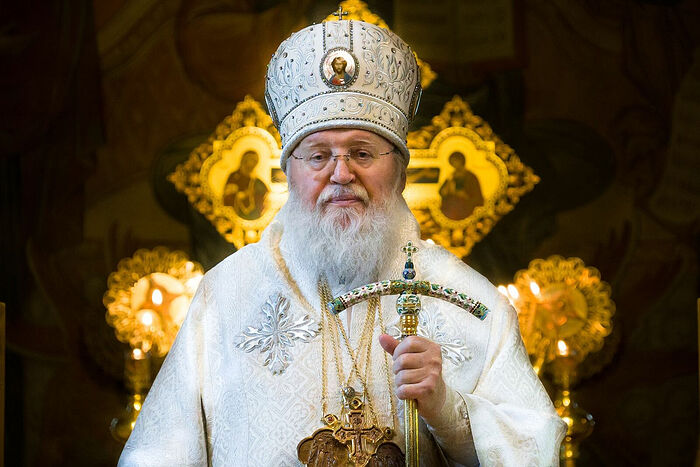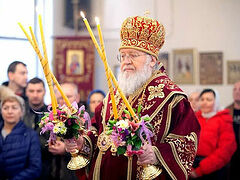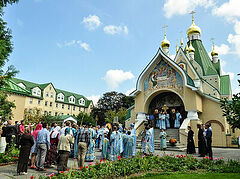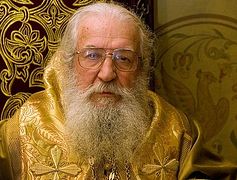Today, May 17, 2022, the Russian Orthodox Church celebrates the 15th anniversary of the signing of the Act of Canonical Communion between the Moscow Patriarchate and the Russian Church Abroad.
And the Lord determined that on the eve of this memorable date, one of the most significant participants in the reunification of the Russian Church, Metropolitan Hilarion (Kapral) of Eastern America and New York, who became the First Hierarch of the ROCOR after the ever-memorable Metropolitan Laurus, departed to Him. On the morning of May 16, our correspondent Dmitry Zlodorev received a text approved by Metropolitan Hilarion from his aide, and at 2:00 pm New York time, Vladyka passed away…
The recollections presented below are, most likely, the last interview that the late First Hierarch gave before his repose.
May the Lord grant rest to the soul of the ever-memorable Metropolitan Hilarion in a place of light, in a place of verdure, in a place of peace, from which sickness, sorrow and sighing will flee!
When I was 17 years old, while in Canada, I wanted to study in Russia and was going to enter the St Petersburg Theological Academy. Or rather, in the 1960s, it was, of course, the USSR and Leningrad. But the then-Metropolitan of Leningrad and Ladoga, Nikodim (Rotov), conveyed to the Archbishop of Edmonton, Panteleimon (Rudyk), that he had tried, but failed, to arrange the acceptance of a student from abroad. It must have been some kind of sign from above.
As a result, I moved from the Canadian parish of the Moscow Patriarchate to the ROCOR. In many ways, this decision was not difficult — it was simply on account of the impossibility to study in Russia. In addition, the letters of Fr Gleb Yakunin about the situation of the Church in the USSR had a certain influence on me. Of course, they were not sent to me personally: they were open appeals about injustice on the part of the State towards the Church. Written in 1966-1967, they became a confirmation of the lack of freedom for believers, and I decided that I could no longer be a member of the Church, which at that time was not free.
By that time, I already knew Bishop Savva (Saracevic) of Edmonton, from the ROCOR. For me, it was a sign that I needed to find another way to study theology. So I then turned to Vladyka Savva, who, with Archbishop Averky (Taushev), determined that I should go to study at Holy Trinity Theological Seminary in Jordanville. And so it came to pass: with their blessing, I went there in 1967.
Of course, in those days even talking about the reunification (of the MP with the ROCOR) was problematic, again because it remained the case that the Church in Russia was not free. But in the Diaspora, we always fostered love for the Russian people in Russia and tried in every possible way to help the faithful there. We have always had love for the Russian Church and its flock. We tried to help in a variety of ways, in particular, with literature, which was sent into the USSR.
A great deal changed when Metropolitan Laurus became the First Hierarch of the ROCOR. Of course, it was already 2001, and those were very different times: the Soviet Union had collapsed and many changes had taken place in Russia. At that time I served in Australia, but, of course, I supported Vladyka Laurus.
I do not think there was any specific moment when he began to think about unification — in my view, he had a constant desire for this. Vladyka Laurus always sought to help Russian Orthodox people in Russia; for example, he tried to send to the homeland as much spiritual literature as possible. While still the rector of the Holy Trinity Monastery in Jordanville, where the printing house was located, he sent many books to our Synod in New York; we packed them and sent them by every means we had available to those people in the USSR, and then in Russia, who asked us for them.
In November 2003 an official ROCOR delegation visited Russia for the first time. Although I did not take part directly in the discussions on unification at its meetings, I was fortunate to be part of its membership. I am certain that it was this trip that began the whole process: we got to know each other, and we decided that it was time to open formal discussions. I would even say that it was a blessing.
I felt joy and satisfaction, at that time, that there was a shift with respect to this question. We started talking to each other, and eventually came to determinations that were acceptable to all.
Of course, there was resistance in our Church. This was explicable by the fact that some people did not yet have confidence in the Moscow Patriarchate; they believed that it was too early to unite and that they could not have confidence in some bishops — for example, even then-Metropolitan Kirill, the current Patriarch. Some made characterisations of a difficult personality, or thought that by his intelligence he might ‘outsmart’ everyone; but in fact, the Patriarch is a very intelligent person who is perfectly able to express his views. And I think he played a big role in the discussions. I could say the same about other hierarchs — in particular, about our Metropolitan Mark of Germany and Berlin, one of the most important participants in the negotiations.
When, in May 2007, we again came to Moscow to sign the Act, I had a very tremulous feeling. I felt that a historic event was taking place: at long last, we had managed to reach an understanding between the two parts of the Russian Orthodox Church, and we had the opportunity to become one, to be in communion with each other.
In all the time that has passed since that day, I have never had even the shadow of a doubt about the correctness of the decision made then. It made it possible to overcome the division between the Russian emigration and the Orthodox people in Russia that had existed for many decades. Thanks to the efforts, first of all, of Patriarch Alexy II and Metropolitan Laurus, our hierarchs arrived at a reunification. This is monumental achievement allowed the Russian Church to become one again.
For me, the past 15 years have been years of joy. Of course, I don’t call to mind every individual minor event, but overall it was a joyful time when we got acquainted with part of the Church in Russia. We are happy that we have achieved unity. And in the time that has passed since then, I have never regretted it. Even when there were some problems, I knew that then we had done everything right.





